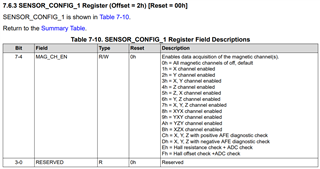Hi Team,
My customer used TMAG5173-Q1 to develop the HMI. I'm not familiar with the part.
Do we need to do initial setting for 0h-Bh register before getting result from 10h-1Ch?I
If so, do we have initial setting script can be referred?
We asked because we can visit the TMAG5173 address, but no result from 10h to 1Ch
Regards,
Roy



